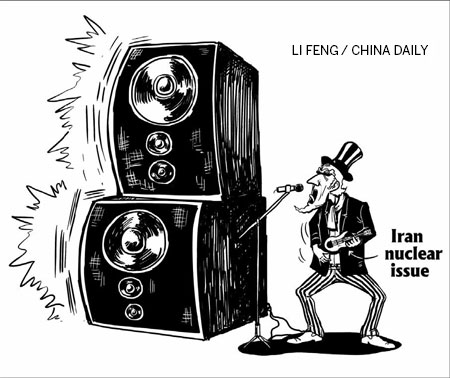US behind the Iran nuclear 'crisis'
Updated: 2012-06-20 08:06
By Ma Xiaolin (China Daily)
|
||||||||

No wonder the new round of talks in Moscow on the Iranian nuclear issue didn't achieve any concrete progress, frankly speaking, no one is confident of solving a matter concerning Iran's core interests through the talks. Especially as the United States has just heightened tensions by issuing new trade sanctions that include China and Singapore.
Actually, the Iranian nuclear issue is not only a matter of nuclear proliferation, it also reflects the lack of strategic mutual trust between the US and Iran. It is the US that has pushed Iran to seek to become a nuclear state, also it is the US has sensationalized Iran's nuclear program as a global issue.
In 1957, in order to compete with the former Soviet Union in the Middle East, the United States and Iran signed a civil nuclear cooperation agreement as part of the US Atoms for Peace program. In 1963, Iran signed the Limited Test Ban Treaty and in 1968 the Nuclear Non-Proliferation Treaty.
But ties between the US and Iran soured after the Islamic revolution in 1979 and Iran turned to the USSR for help.
In 2003, one year after the Iranian nuclear program became news headlines worldwide, the Iranian government signed the protocol allowing snap inspections of nuclear facilities by the International Atomic Energy Agency.
However, the US continued to put pressure on what it called a "rogue state". In 2005 Mahmoud Ahmadinejad was elected president and adopted a hardline nuclear policy, saying in 2009 that Iran would not retreat "one iota" on its right to a nuclear program. That's how the Iranian nuclear problem turned into a "crisis".
Today the crisis is so deep that a basic question is ignored: Does Iran have the capacity to produce nuclear weapons? The answer, according to experts, is not as certain as the US claims. For weapons use, at least 90 percent pure uranium is required, but Iran cannot even produce 20 percent pure uranium for medical and experimental use. Even if they make breakthroughs one day they will still need to conduct nuclear explosion tests and acquire other technologies to develop a useable weapon.
Even Iran's intention of developing nuclear weapons is in doubt. In February Iran's supreme leader Ayatollah Ali Khamenei openly said that nuclear weapons of mass destruction are contrary to Islamic teachings and the state does not intend to own them.
In its fight against the US, Iran uses some flexible terms such as "nuclear rights" and "nuclear capacity". The intention is clear: Iran wants to emphasize its independence and sovereignty, while leaving some room for developing nuclear weapons if necessary and ensuring domestic order by emphasizing external pressure and antagonism.
The US and its Middle East allies must be fully aware that Iran has no capability to produce nuclear weapons. So the question becomes: Why do they keep making a fuss over Iran's nuclear program?
The US has its own agenda in exaggerating the Iran nuclear crisis: to prevent an external enemy from becoming a nuclear state, and maintaining, even strengthening, the military dependency of other Middle East countries on the US, so as to export weapons to them and keep military bases in their domains.
Israel has different reasons, primarily because it faces an actual security threat as Ahmadinejad, who has said he would like to "wipe" Israel off the map, has long-term plans for training Hezbollah in Lebanon and Hamas in Palestine. Also it is widely believed to have a regional monopoly on nuclear weapons, which it wants to maintain, and it wants to shift the world's attention from Palestine.
For the Sunni-led Arabic states, a nuclear-armed Iran is viewed as more of a threat than Israel, as Iran is the only nation that is overwhelming Shiite.
We don't need to worry about an Israeli or US attack on Iran at least before the Syria crisis comes to an end. The US and its Arab allies want Syria to become the first domino to fall, and are trying to keep Iran from intervening in the Syrian crisis. Obviously, this is both an easier and "more moral" path because Syria has opposition groups calling for humanitarian assistance. They would not risk an all-out Arab-Israeli war before the situation in Syria is resolved.
The US will not truly implement its sanctions against China and Singapore either, because it does not want to face too many opponents. After all, no matter if the US wants to or not, it has to seek cooperation with, rather than opposition from, China to solve many international issues.
The author is an observer of Middle East affairs.

 Relief reaches isolated village
Relief reaches isolated village
 Rainfall poses new threats to quake-hit region
Rainfall poses new threats to quake-hit region
 Funerals begin for Boston bombing victims
Funerals begin for Boston bombing victims
 Quake takeaway from China's Air Force
Quake takeaway from China's Air Force
 Obama celebrates young inventors at science fair
Obama celebrates young inventors at science fair
 Earth Day marked around the world
Earth Day marked around the world
 Volunteer team helping students find sense of normalcy
Volunteer team helping students find sense of normalcy
 Ethnic groups quick to join rescue efforts
Ethnic groups quick to join rescue efforts
Most Viewed
Editor's Picks

|

|

|

|

|

|
Today's Top News
Health new priority for quake zone
Xi meets US top military officer
Japan's boats driven out of Diaoyu
China mulls online shopping legislation
Bird flu death toll rises to 22
Putin appoints new ambassador to China
Japanese ships blocked from Diaoyu Islands
Inspired by Guan, more Chinese pick up golf
US Weekly

|

|







